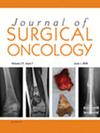非转移性上消化道癌症患者手术流失的原因:单一机构的经验
IF 2
3区 医学
Q3 ONCOLOGY
引用次数: 0
摘要
导言上消化道癌(UGI)需要多学科治疗,但手术是唯一可能治愈的选择。我们试图了解本地区医院网络中手术前减员的原因。方法 我们对 2015 年至 2021 年期间多医院癌症登记处的 I-III 期 UGI 癌(胃食管交界处癌、胃癌和肝胆腺癌)患者(18-80 岁)进行了病历回顾。我们的主要结果是手术减员的原因。单变量分析确定了与手术减员相关的因素,Kaplan-Meier法根据手术收据估算了总生存率。结果我们的分析纳入了792名患者,其中107人(13.5%)未接受根治性手术。未接受手术的原因包括:医学合并症(30.8%)、患者偏好/非医学障碍(24.3%,包括:没有进一步解释就不感兴趣、担心并发症、不遵守预约、保险问题、不希望输血、缺乏社会支持、喜欢家庭护理以及担心复发)、社会心理(5.6%)、在接受新辅助治疗或等待移植期间病情恶化(15.0% 和 7.5%)、表现不佳(3.7%)、新辅助治疗的副作用(3.7%)以及与治疗无关或原因不明的死亡(9.4%)。非手术治疗与种族、社会经济地位或就医距离无关。接受手术治疗的患者的生存期大大提高(158 对 63 周,p < 0.05)。结论在我们的学术癌症中心接受评估的上消化道癌患者中,每七名患者(18-80 岁)中就有近一名没有接受手术切除。手术减员的原因包括潜在的可改变问题,解决这些障碍有助于克服癌症治疗和生存方面的不平等。本文章由计算机程序翻译,如有差异,请以英文原文为准。
Reasons for Surgical Attrition Among Nonmetastatic Upper Gastrointestinal Cancer Patients: A Single Institutional Experience
IntroductionUpper gastrointestinal (UGI) cancers require multidisciplinary treatment, but surgery provides the only potentially curative option. We sought to understand reasons for attrition before surgery within our regional hospital network.MethodsWe performed chart reviews of patients (age 18–80) with stage I–III UGI cancers (gastroesophageal junction, gastric, and hepatopancreatobiliary adenocarcinomas) in our multihospital cancer registry from 2015 to 2021. Our primary outcome was reasons for surgical attrition. Univariable analysis identified factors related to surgical attrition and the Kaplan–Meier method estimated overall survival based on surgery receipt.ResultsSeven hundred and ninety‐two patients were included in our analysis, of whom 107 (13.5%) did not undergo curative surgery. Reasons for not undergoing surgery included medical comorbidities (30.8%), patient preference/nonmedical barriers (24.3%, which included: not interested without further explanation, worried about complications, nonadherence to appointments, insurance issues, did not wish for blood transfusion, lack of social support, preferring home care, and worried about recurrence), psychosocial (5.6%), progression while on neoadjuvant therapy or waiting for transplant (15.0% and 7.5%), poor performance status (3.7%), side effects of neoadjuvant therapy (3.7%), and death unrelated to treatment or unknown cause (9.4%). Nonsurgical management was not associated with race, socioeconomic status, or distance traveled for care. Survival was greatly improved for patients who underwent surgery (158 vs. 63 weeks, p < 0.05).ConclusionNearly one in seven patients (18–80 years old) with UGI cancers evaluated at our academic cancer center did not undergo surgical resection. Reasons for surgical attrition included potentially modifiable issues, and addressing these barriers could help overcome inequities in cancer treatment and survival.
求助全文
通过发布文献求助,成功后即可免费获取论文全文。
去求助
来源期刊
CiteScore
4.70
自引率
4.00%
发文量
367
审稿时长
2 months
期刊介绍:
The Journal of Surgical Oncology offers peer-reviewed, original papers in the field of surgical oncology and broadly related surgical sciences, including reports on experimental and laboratory studies. As an international journal, the editors encourage participation from leading surgeons around the world. The JSO is the representative journal for the World Federation of Surgical Oncology Societies. Publishing 16 issues in 2 volumes each year, the journal accepts Research Articles, in-depth Reviews of timely interest, Letters to the Editor, and invited Editorials. Guest Editors from the JSO Editorial Board oversee multiple special Seminars issues each year. These Seminars include multifaceted Reviews on a particular topic or current issue in surgical oncology, which are invited from experts in the field.

 求助内容:
求助内容: 应助结果提醒方式:
应助结果提醒方式:


